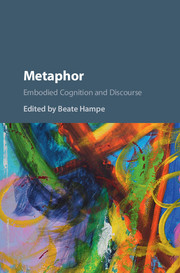Book contents
- MetaphorEmbodied Cognition and Discourse
- Metaphor
- Copyright page
- Contents
- Figures
- Tables
- Contributors
- Editor’s Preface and Acknowledgments
- Introduction
- Part I Metaphor in Cognition
- Part II More than Metaphor
- 7 Source Actions Ground Metaphor via Metonymy: Toward a Frame-Based Account of Gestural Action in Multimodal Discourse
- 8 Metaphor and Other Cognitive Operations in Interaction: From Basicity to Complexity
- 9 On the Role of Embodied Cognition in the Understanding and Use of Metonymy
- Part III Metaphor in Discourse
- Part IV Salient Metaphor
- Epilogue (A Personal View)
- References
- Person Index
- Subject Index
8 - Metaphor and Other Cognitive Operations in Interaction: From Basicity to Complexity
from Part II - More than Metaphor
Published online by Cambridge University Press: 05 July 2017
- MetaphorEmbodied Cognition and Discourse
- Metaphor
- Copyright page
- Contents
- Figures
- Tables
- Contributors
- Editor’s Preface and Acknowledgments
- Introduction
- Part I Metaphor in Cognition
- Part II More than Metaphor
- 7 Source Actions Ground Metaphor via Metonymy: Toward a Frame-Based Account of Gestural Action in Multimodal Discourse
- 8 Metaphor and Other Cognitive Operations in Interaction: From Basicity to Complexity
- 9 On the Role of Embodied Cognition in the Understanding and Use of Metonymy
- Part III Metaphor in Discourse
- Part IV Salient Metaphor
- Epilogue (A Personal View)
- References
- Person Index
- Subject Index
Summary
By combining three complementary perspectives, the present chapter goes beyond previous treatments of figurative language in general and of conceptual metaphor in particular. Besides viewing metaphor in terms of the basic cognitive processes underlying it, it also investigates how metaphor combines with other metaphors and with metonymy and in what way it is related to other cases of figurative meaning construction. The present chapter paves the way toward an encompassing theory of meaning construction that employs a highly restricted set of principles to account for a broader range of phenomena than previous accounts have done.
Information
- Type
- Chapter
- Information
- MetaphorEmbodied Cognition and Discourse, pp. 138 - 159Publisher: Cambridge University PressPrint publication year: 2017
Accessibility standard: Unknown
Why this information is here
This section outlines the accessibility features of this content - including support for screen readers, full keyboard navigation and high-contrast display options. This may not be relevant for you.Accessibility Information
- 37
- Cited by
